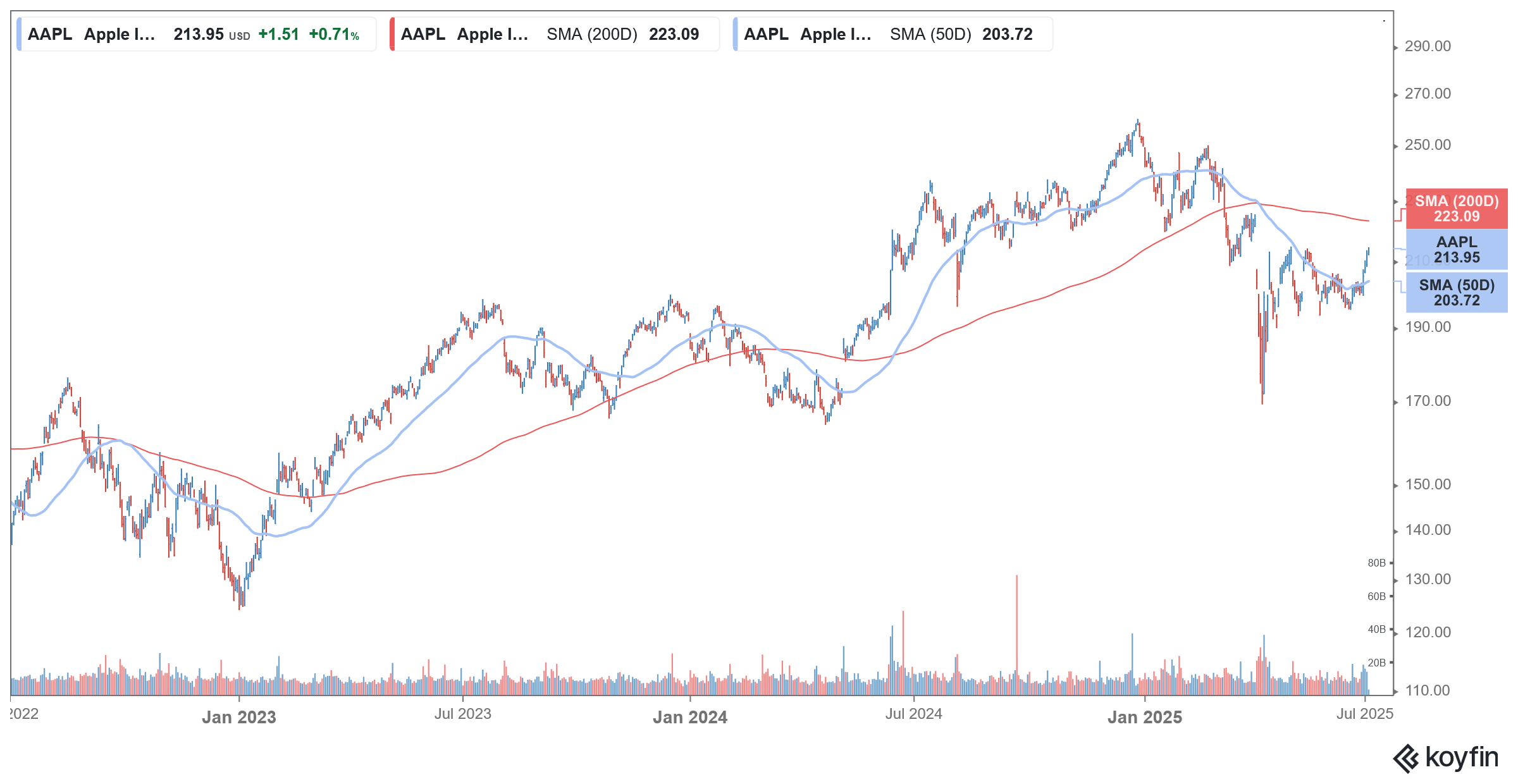Apple Gained Market Share in China in Q2 as Sales Rise
Please note that we are not authorised to provide any investment advice. The content on this page is for information purposes only.
While Apple (NYSE: AAPL) has been in the news for tepid sales in China, according to data from Counterpoint Research, iPhone sales rose in China in Q2, helping it become the second-largest smartphone seller in the country after Huawei.
According to Counterpoint, iPhone sales rose 8% YoY in Q2, even as the overall smartphone sales in the country only went up slightly during the quarter, helping Apple take market share in the Chinese market. Notably, the last time Apple reported a rise in iPhone sales in China was in Q2 2023. Since then, the company’s sales have sagged in the country as domestic companies have taken market share.
Table of Contents
Apple Gained Market Share in China in Q2
Meanwhile, the Q2 sales growth came amid promotional pricing from Apple. As Counterpoint Associate Director Ethan Qi said, “Apple’s adjustment of iPhone prices in May was well timed and well received, coming a week ahead of the 618 shopping festival.”
Notably, the 618 Shopping Festival is China’s second-biggest such event after Singles’ Day (11.11). The midyear shopping festival, which is primarily focused on online sales, started early this year, and with a stretch of almost 40 days, it was the biggest ever since it was started by Chinese e-commerce giant JD.com in 2004.
China’s retail sales have seen some traction after the country launched a trade-in program for consumer products, provided a subsidy for purchases, and some local governments even issued consumption vouchers.
Apple Is Facing Several Headwinds in China
However, the bump might be short-lived according to some analysts. “Second quarter performance has been propped up by the national subsidy for smartphones, but it looks like the program will be scaled back during the latter half of the year. This creates some risk, especially considering the recent sales season was uneventful,” said Counterpoint Senior Analyst Mengmeng Zhang.
Apple lost its position as the biggest smartphone seller in China last year and fell to the third spot as domestic Chinese rivals gained market share at the iPhone maker’s cost. Vivo was the top-selling brand in the world’s second-biggest economy last year, followed by Huawei, whose sales have surged over the last two years.
Apple Intelligence Features Are Not Available in China
Several factors seem to be hampering iPhone sales in China, including the unavailability of “Apple Intelligence” features. These artificial intelligence (AI) features were expected to be the key selling point for iPhone 16, but were launched much after the model went on sale. However, these features are not available in China and the E.U. due to regulatory issues.
Moreover, the rise in US-China tensions is also working to the detriment of US brands. China is increasingly becoming a tough market for foreign brands like Apple, General Motors, and Starbucks, as Chinese consumers have been increasingly pivoting to domestic brands.
OpenAI Is Foraying Into Hardware
While Apple gaining market share in China in Q2 is a welcome break, the iPhone maker faces several other headwinds.
In what could be a challenge to Apple, OpenAI is looking to foray into the hardware space with its $6.4 billion acquisition of io Products. The startup was founded last year only by Jony Ive, who is credited with designing several Apple products, including the iPhone.
Notably, Apple hasn’t been able to come up with a product like the iPhone in years. The company did design the Vision Pro headsets, but the sales of the $3,500 gadget have been tepid at best.
Reports suggest that Apple might be working on AI-powered glasses that could have built-in speakers and microphones. However, it remains to be seen whether that product can be the next major computing platform and, importantly, fend off competition from Meta Platforms’ smart glasses as well as hardware products that OpenAI might launch.
Separately, Apple’s Services business, which is the company’s most profitable segment, is also facing regulatory heat. A US federal judge ruled that Apple needs to allow competition in the App Store.
While Apple does not break down the revenues that it receives through the App Store fees, they are part of its hugely profitable Services business, whose gross margins are about twice that of the product business. The segment reported record revenues of $26.6 billion in the March quarter, which were up 12% YoY despite adverse currency movements. Notably, while in previous quarters, Apple used to provide some color on the segment’s revenue guidance, it refrained from doing so, citing “uncertainty from several quarters.”
AAPL Is Lagging Behind Tech Peers in AI
Many believe that Apple is lagging behind tech peers in AI. In a related move, Apple is currently facing a shareholder class action lawsuit that alleges that the iPhone maker overhyped its progress in AI and misled investors about the timeline for integrating advanced AI features into its Siri assistant.
Shareholders argue that at its June 2024 Worldwide Developers Conference (WWDC), Apple led them to believe that AI, particularly “Apple Intelligence” features designed to enhance Siri, would be a key driver for iPhone 16 devices and would be ready for launch. However, the lawsuit claims Apple lacked a functional prototype of these AI-based Siri features and had no reasonable basis to believe they would be ready for the iPhone 16.
Meanwhile, Apple is reportedly seeking to enhance its capabilities in AI-driven search and potentially reduce its reliance on Google’s search engine, which currently generates an estimated $20 billion annually for default placement in Safari.
Reportedly, Apple executives internally discussed acquiring artificial intelligence (AI) startup Perplexity to bolster its AI capabilities. Perplexity, known for its conversational AI search tools that provide summarized information from the web, recently closed a funding round valuing it at $14 billion. An acquisition at this price would be Apple’s largest ever, surpassing its $3 billion purchase of Beats in 2014.






